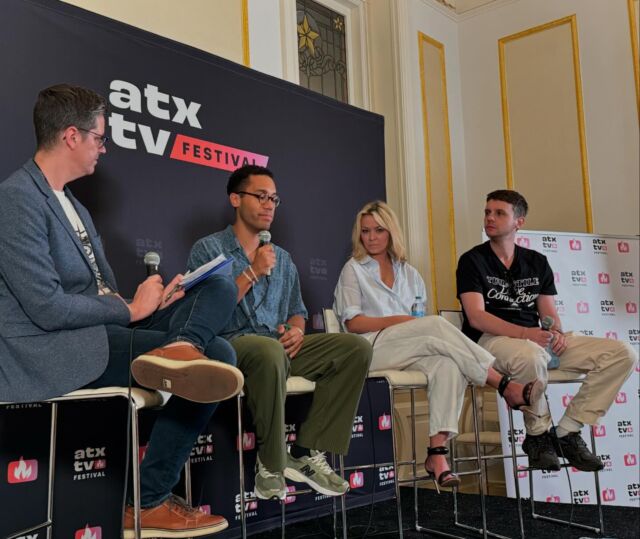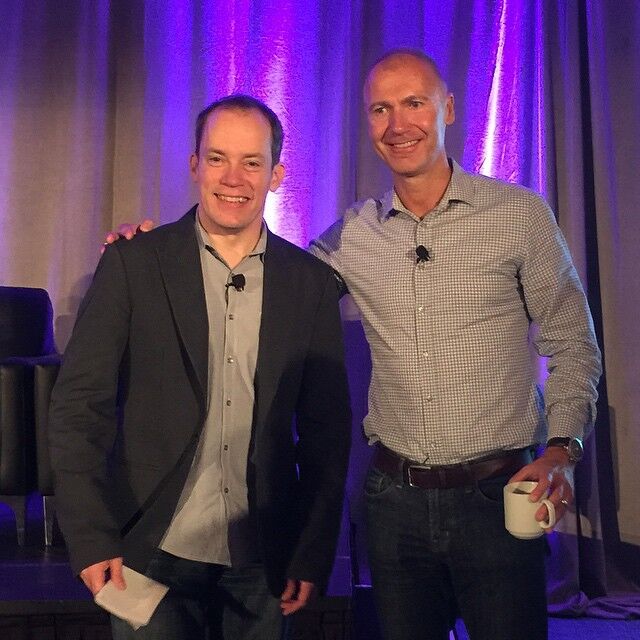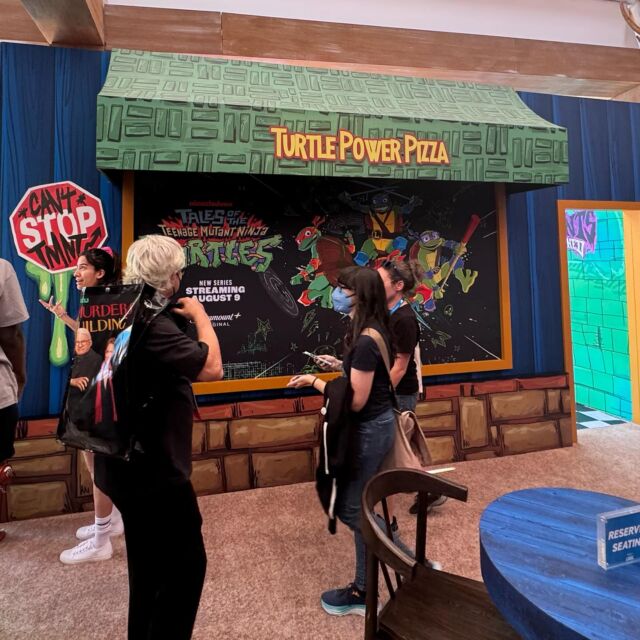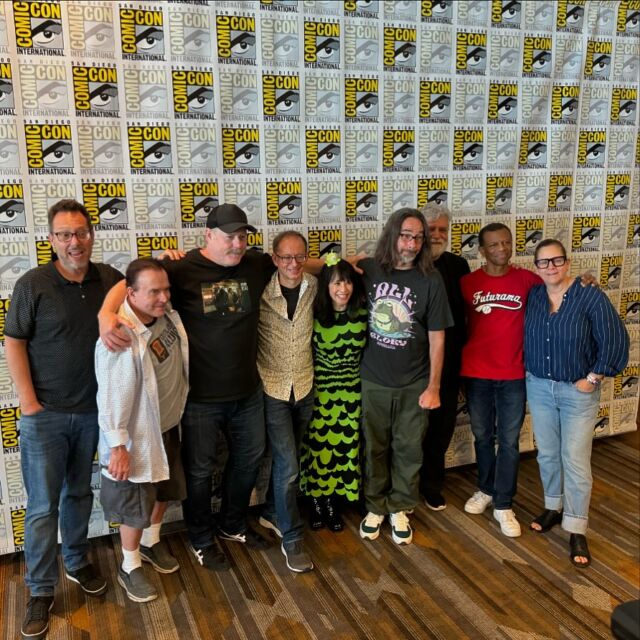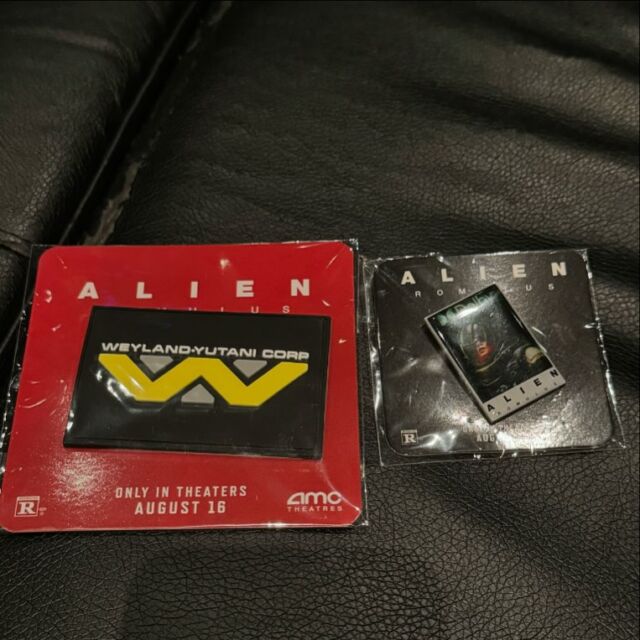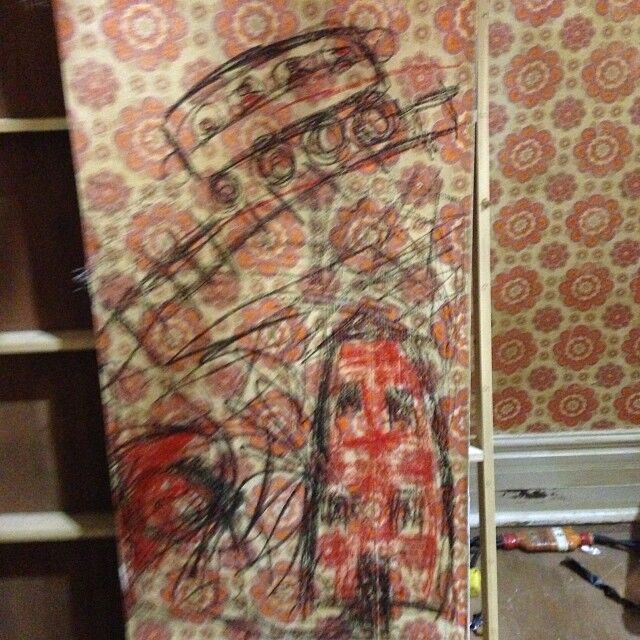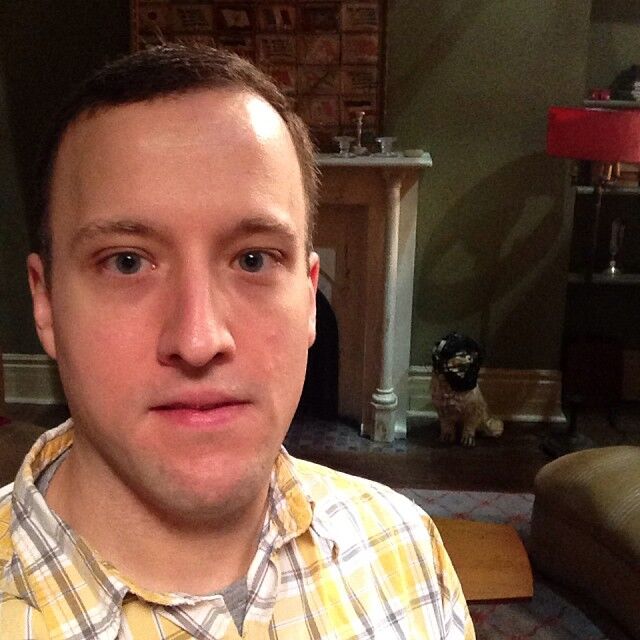 Tomorrow night is the season finale of The Lying Game on ABC Family at 9/8c. Adrian Pasdar, who plays Alec Rybak on the show, recently participated in a Q&A session to discuss his work on the series. Here’s a transcript from that Q&A.
Tomorrow night is the season finale of The Lying Game on ABC Family at 9/8c. Adrian Pasdar, who plays Alec Rybak on the show, recently participated in a Q&A session to discuss his work on the series. Here’s a transcript from that Q&A.
The wedding proposal seemed to happen so quickly. Is Alec suspicious of Rebecca’s motives, or has he completely fallen in love with her?
A. Pasdar: I think it’s an excellent question. The way these things are written, we service an ongoing flat line. But before all that happens, I had … with Chuck Pratt and the writers. One of the things we can always be assured of is that whenever I think a fellow like Alec makes a move, it seems to be without motive. Nothing altruistic about his intentions. I think there is something behind his accepting it so quickly that we will come to find out in the follow-up to the finale.
Alec may possibly be responsible for the death of Derek, the attack on Sutton and then Eduardo’s car accident. Is Alec as evil as we have been led to believe, or could he be trying to cover up for someone?
A. Pasdar: I think it’s always a little more interesting when it’s not just good or bad; when there is liquidity to the morality. I think Walt Disney said it best, when he said a show is only as good as the bad guy is bad. This is a different show so it makes it work perfectly for us. When it suits the show, he’s reprehensible in his behavior at times. But I think ultimately we’re going to find out that it’s not all as bad as you think. There is a great deal of protecting going on. Although, for who, I can’t say. I’m not at liberty.
Could you tell us about some of your most interesting fan interactions?
A. Pasdar: I don’t know if I can say some of the most interesting ones, but some of the most print-worthy ones. People, generally when I run into them, they know I’m not a bad guy. They generally know I’m playing one on TV, but they always seem to keep a good distance between myself and them. Even when we’re coming in for a picture. They’re always looking over their left shoulder, if they’re hugging me, making sure I’m not going to strangle them or something.
I think there is a good deal of believability in the nastiness of Alec. But there is also a vulnerability that we haven’t gotten into yet, but I can assure it’s there. My relationship with the fans on this one, and other roles, has always been positive. It’s great. I haven’t had really weird altercations or anything.
When you were in high school, what series were you a big fan of?
A. Pasdar: Rockford Files. Gosh, when I was in high school, Rockford Files—that was probably the The Six Million Dollar Man, and then by extension, The Bionic Woman—Jamie Summers. Those were the shows that were big. There were only a couple channels back then, so it’s easy to recall.
Alec seems to be at the center of almost all of the show’s juiciest moments and juicy stories. Is it challenging playing a character that’s really involved at the center and core of the show like that?
A. Pasdar: No. Challenging? I mean, yes, it’s challenging in the extent that you have to be consistent with your intention, and with your work, and stay on top of your game. For shows like this they pay you really to wait between setups. The acting I do for free. This stuff—the juicier the better. I just happened to watch two shows. I’ve never seen the show before because every time I’m working late Monday nights or I’m at the hotel and they don’t have the ABC Family Channel where we film.
I just saw the show for the first time last night, two of them in a row, the last two episodes. I got to say, man, the cast I’m working with are remarkable. To be at the center of anything that the writers write, I feel an immense comfort because the talent of these actors really supersedes a lot of the stuff that is on TV. It’s really—I feel very fortunate to be amongst this caliber of people.
To be in the center of it, I know I’m going to be able to have a really good round robin with whoever I’m working with. I’m charged about it.
Speaking of the cast, Charisma Carpenter’s character, Rebecca, showed us a new side of Alec this season. You two have really great onscreen chemistry. What has it been like working with her, and how do you think that’s changed your character on the show?
A. Pasdar: It’s a tough question to come up against a character like Alec. Charisma, she’s got a lot of moxie. She got stones, as my father would say. It’s fun to work with her because she can—I tend to be somewhat unpredictable and she can roll with it. She makes me better, which I think probably is the best thing that I can say about anybody. I feel confident that when we get done with our scene, it’s going to be better than it was before we started it. We lifted off the page and she’s wonderful to work with.
In your career you played a lot of villain-type characters from Nathan Petrelli in Heroes to now Alec Rybak in The Lying Game. Do you feel like you’re being typecast into these roles now, or are you actively seeking them out to play?
A. Pasdar: Oh, no, sir. I’m looking for them. The real fun in theater, film, or television, I think is playing the bad guy. There is just a lot of weight put on trying to be that super good looking heartthrob, leading man. I just don’t find it very rewarding. I think the reward for me—I’m not saying that those roles aren’t rewarding, but for me, the reward best comes when you can challenge somebody’s concept of what’s right and what’s wrong because it shifts for everybody, depending on what they need. To be the guy that can service that part, that’s exciting for me. I’m interested in that. I have actively sought them out, to answer your question.
Would you ever seek out a hero type role?
A. Pasdar: I think in the end of every show I’ve done, there has been an element of redemption. Nathan Petrelli, I think was a perfect example of somebody who could be misconstrued as a bad guy. Then in the end you reveal that he’s doing it to protect some people and ultimately the world. He sacrifices himself. At the very end of that show, that series, if you remember, that’s what happens. Yes. I like the idea of sending a good, positive message, especially to my children. But the sole value of entertainment, it’s fun to be the bad guy.
Alec has a great ability to avert questions on the show. He’s able to get out of having to answer for any of his actions. Would you consider him to be a chameleon?
A. Pasdar: Yes, good question. Chameleon? A guy like him stands out in an arena. I don’t think he thinks of himself—or when I’m playing him, I don’t think of not so much blending in as so much—I guess more blending out is what he tries to do. To remove himself from a situation that could be compromising by not placing himself in it to begin with, having other people do the work for him, is probably one of the things he does best.
He seems to be the reason that a lot of lies are exposed, or a lot of lies are told. How do you think that he gets himself involved in everyone else’s business, why do you think he does that?
A. Pasdar: Why, as opposed to how? At the root of what we’re dealing with, a story that is much bigger in its enormity that’ll be revealed as to how Alec and everyone else fit into Mayberry, in their little world. Without—obviously I can’t say too much, but I think it’ll be surprising to some. Some may see it coming, although nobody has yet. In all the questions and all the press I’ve done, and all the fan responses, and the blog time I’ve spent, nobody gets quite what they’re after yet, the writers.
I can’t finally comment on your question ultimately because it hasn’t been portrayed. It hasn’t been played out. But, he does find himself—I think there is a certain joy in the activity of being a part of other people’s lives to the extent which maybe they don’t want, but need. I think he sees himself as a medicine man for his tribe. Sometimes the medicine is a tough pill to swallow, but it does the job.
You do the suave, sinister role so well. Do you have inspiration, because you really don’t seem like that’s how you are in real life? Do you have any particular actors that are inspirations that help you tap into that?
A. Pasdar: It’s funny, as you go on in this business, you end up slowly carving away at the totem poles that informed you earlier about how behavior is disseminated, and how it’s interpreted and digested. There are a lot of great actors and more importantly, I think, a lot of great individuals at the center of a lot of political storms, whether it’s environmental, or ecological, or financial, that you can draw from to create a character like Alec Rybak.
Because you find these guys on Wall Street and on Main Street. You find these guys in every town. It’s just a degree—if you dress them up in overalls or you put them in a suit and tie. Very often they can be the same guy. It’s not to make a blank anonymous statement about who these character people are I draw from, but they’re out there. They’re not hard to find. They’re sitting in the restaurant, or on the bus, or in the bar, or on the boat with you.
Wherever you are, you’ll find somebody with that sensibility. The other thing is, the great part is, I get to play it out in a scripted format. I know what the result is going to be with my action before I do it, which gives me the power to play it as strongly as I do. In real life, it’s a little more tricky.
Do you have anything lined up for the hiatus? Or are you just kicking back with the kids?
A. Pasdar: Yes, I’ve got my family lined up. This has been a tough job on them because I’ve had to commute so much. Then there were two movies that I did in the interim. I did a pilot for HBO and a movie in New York as well that the folks from The Lying Game were very wonderful to accommodate. It’s a feature film that shot in 3D called Run with William Moseley, the boy from Narnia.
It’s about Parkour, which is a whole, brand new concept to American audiences. We saw a taste of it in the beginning of Casino Royale. David Bell and those guys from France came across and did all this stuff for the beginning of that movie. If you’ll remember what Daniel Craig was doing, all the jumping and stuff like that. That is what Parkour is, the very beginning of it.
I’m going to take some time off because the three projects I’ve been juggling for the last four months—my family now looks at me going, Dad, we need you. We want you home, buddy. We love you. I’m like, I’m exactly the same. I’m going to take some time and just be at home until we go back in May.
It seems so far Alec has really been able to orchestrate lots of shady dealings without consequence because of his position of power. But it seems like things are starting to finally catch up with him. Is he going to have to face the music soon?
A. Pasdar: I think the music that Alec listens to is the string section that nobody else can hear. I really think he’s got so many dogs in the hunt right now that we don’t realize. What’s really cool is that they’ve laid out a lot of clues. One of the best clues that I’ve seen that nobody’s commented on—like I said earlier in one of the questions, I haven’t watched a lot of the shows because I haven’t been able to. I’ve been working or otherwise engaged. But, one of the best clues that nobody has said anything about was two episodes ago when—do you remember—the car broke down by the side of the road?
Thayer asked Emma to hand him the lug wrench, and she says, I wouldn’t even know what that is. It’s the thing right there. The tire iron. You remember that scene? Anyways, it’s kind of interesting. There are so many clues laid out in this show so beautifully that just go by quiet and unnoticed about who may be involved in what. I’m just saying. That picture of me swinging a tire iron, like I said. What I love about the show is the way that they’ve laid out the clues. To be a part of it, that’s about as fun as it gets.
As far as his engagement to Rebecca goes, does he really love her? Or is this another calculated move in his game?
A. Pasdar: I think for a guy in his position it may be a combination of both. Somebody who’s relied so heavily on Machiavellian tendencies to remove him, or to extricate himself or his loved ones from situations, to actually be confronted with somebody who he admires, not only for their ability to make him feel loved, but to make him feel challenged by their own ability to be duplicitous. I think they’re a really healthy combination. I don’t think it’s one or the other. I think it’s both. I think he really admires/loves her/needs her. Slash.
Can you tell us a little bit about Alec’s first marriage, and maybe where Thayer and Mads’ mother is?
A. Pasdar: I can. We haven’t really decided exactly, but I can tell you one of the avenues that we’ve considered. Because you know these things are retooled, and retooled over and over again, until they’re finally unloaded. I think one of the great things is that—her name was Christina, let’s say. She may have been a dancer and wanted to pursue a life in the theater.
She may or may not have—how much can I tell you? She may or may not have betrayed Alec’s trust in some fashion. Yet, when confronted with her actions, he still realized that she was the only one that was ever going to have his heart. He was prepared to forgive her. She was not prepared to ask for that forgiveness. Maybe she went away. Perhaps, I’m just speculating—I’m spit balling here—but maybe she was the one that got away and Alec vowed that nobody would ever get close again. Nobody would ever have his heart.
She actually left, and left him with his children, who he obviously loves. That’s been part of the motivation for why he’s been so protective of Mads and Thayer from the beginning of the show. He’s afraid she’s going to try and come back and reclaim—I wouldn’t say afraid. He’s just protecting them from who he knows she really is. That’s kind of the back-story.
Will Alec and Rebecca in the finale actually go through with the wedding? Or will someone try and stop it?
A. Pasdar: I can’t say. Gosh!
All I can say is, yes, to everything.
I’m sure they’ll try and go through with it. I’m sure somebody is going to try and stop it. I’m sure that it’s not going to go off as planned. It’s not going to end like a normal wedding, let’s say.
When you’re acting, especially with a role like this, are you drawing upon any personal experiences to try to get the feelings, or people you know, or you just go with the lines? How do you go about it?
A. Pasdar: It’s not science. It’s just you’re up there; you got the words in your head. You’re looking at the people that are standing opposite. You’re both wearing makeup and you’re dressed in other people’s clothes. Once you get all those three things sorted out, the best you can do is reinterpret what you thought you understood in your head sometimes. Acting is such a beautiful lying game in its own. I love the title of the show for many reasons.
But acting with a—I’m wrapped up in right now, has never been more rewarding. This is just great. It’s not based on people in my personal life. But, of course, it is at the same time. How could I extricate anybody? Ultimately, I’m just trying to create something like Nabokov might have for one of his novels. I’m just trying to make something real and interesting and to have something that means something. If it’s lost, it’d be a detriment to that character.
Something has to be at stake, especially in TV. Less so in movies, but every scene in TV, something has to be at stake for an actor. Otherwise, it’s boring. I do believe at the end of the day, if you’re boring, you get punished. I don’t know if that answers your question or not, but it’s how I feel about it.
You’re married to one of the Dixie Chicks, Natalie Maines. Is there any chance that they might be having a musical performance with the Dixie Chicks in future episodes?
A. Pasdar: I don’t think that’s likely. But what is interesting is that when we first started the show, before it aired, Charles Pratt, the Executive Producer and developer of the show, asked me if Natalie would be interested in writing a theme song for the show. I was on a highway out here in Los Angeles and we were headed to the airport or something and I said it to her. She said, yes, well, yes I would. When does it have to be in? He said by the end of the day, or something like that.
We missed that opportunity. Not her so much, she doesn’t need it. But I think the show would have—I love what the theme song is, don’t get me wrong—her tongue is a gun and all that. That’s great. But Natalie, they did offer her the opportunity to come up with the theme song for the show, and I thought that would have been fun. But, no, she’s highly musical so there is no real telling where she’s going to turn up. But I don’t think that the Dixie Chicks are going to be doing a performance in the show.
Who would you like to see as a guest performer, or a guest star?
A. Pasdar: I’d like to see Tom Waits. You go ahead and write that script. Who would I like to see? Gosh. Man, the casting directors, they’ve done such a great job. I’m just thrilled with whoever they bring down the pike because the actors I’ve had a chance to work with—Tyler, Chris, these guys are just unbelievable. Every single one of them. Whoever the casting people bring to us I’m happy with.
Alec’s approach to parenting is different than Dr. Mercer. Then there’s Dan, Ethan’s older brother, who’s pretty much a father figure as well. They have different ways of approaching being a dad. Who do you think is doing the best job?
A. Pasdar: That’s subjective, but I know who’s doing the hardest job. I can’t tell you the answer to that. But, I also know who’s doing the worst job and who’s just getting by. But, I can’t tell you who those people are. You have to infer from what I’m about to say. I think that there is a good deal of paternal involvement in the lives of these young folks.
The path that the individual fathers have chosen early on, I think was decided by mistakes that they made, not successes, which is interesting in this show. These men are dealing with results from actions that they made as boys. I think it’ll come out probably by the middle to the end of the second season. You’ll see who’s a champ and who’s a chump.
Do you actually ever draw on your experience as a father when you’re playing this role?
A. Pasdar: I want to give you an interesting answer. I just don’t have one at the tip of my tongue. It’s hard to—my personal and professional lives are so separate that I’m sure I do. I just don’t have an example to give you. I’m trying to give you some good stuff to type up and put in your thing, but it’s such a—working on a show like this with writers like this, there is a solid consistency to my day-to-day on The Lying Game.
But, in real life there is an even better, bigger, consistency that I deal with, which is the love of my family and my children, and the life I live with my friends. I just utterly can’t cross-pollinate there. I’m sure I do. But when asked if I do, I’ll probably say no.
Do you already know the secret history behind what was done to Rebecca by Alec and Ted?
A. Pasdar: Yes.
Is there any way that you can give a clue?
A. Pasdar: That wouldn’t serve anybody, really, for me to say what I think that—yes, I can give you a clue. I have to make it really good though. One you’ll never get. Then it’s not really a clue, is it? Let’s see. I would watch the show, as a viewer, with an eye toward the seemingly irreverent details that very often are thrown in an off-hand manner by actors, as they’re instructed to do and as it’s written.
The clues in The Lying Game are buried, but they’re not buried deep. They’re buried at the end of scenes. Very often somebody off-camera will say something, or an actor in a nonchalant way will deliver a line that seems inconsequential. It seems meaningless. It just seems like a wrap-up to a conversation. But it’s there and the writers have very diligently put these clues in every single episode.
It’s amazing actually, because like I said to one of the earlier interviewers, I just watched a couple of the episodes last night for the first time and I was stunned at how much information was actually revealed that nobody probably picked up on because it’s so—the foliage around it is so green that you don’t see the bare stem of truth that’s growing behind it. It’s kind of amazing. It’s Shakespearian in a way.
Actually, it’s beyond Shakespearian because Shakespeare always put that stuff out there blatantly, and then let you back-off and gasp at the fact that no way he could have told the truth in that moment. This series has such a collective team of writers that they’ve really let it go. The secret is already out there. It’s been told three times. I can’t tell you which episode, but the truth has come out three times in the last ten episodes about who is responsible for what. That’s all I can say.
What is it about Alec that you admire?
A. Pasdar: He’s loyal. That’s it. If you’ve got him as a friend, you have him as a friend.
I think we’ve seen a lot of that with Ted.
A. Pasdar: Yes. There is a lot more that you haven’t—a lot more that you actually have seen, but haven’t digested, I think. I wish I could say more, I really do. I’d love to be able to sit and talk with you about what’s happening. But at the same time I’m trying—I’ve got these velvet handcuffs on. Yes, there is a lot of loyalty going on.
Do you have a background in comedy?
A. Pasdar: No. I might have a foreground in it.
You think you might do some comedy sometime in the future?
A. Pasdar: Oh, man. I’d love to. I tell you what, we crack up on this show like it’s nobody’s business. The funniest thing on this show is the outtakes, because there are moments of me being super serious with all this, and then all of a sudden I’ll just do a spit take. It’s not because I’m trying to do something funny, it’s just because the weight of the ridiculousness that we’re dealing with—basically a soap opera. It’s funny, but we have really good actors, super high-end people. The funniness that you’re talking about is something I’ve learned from just—oh should I say it—decades of doing what I do.
There are many fans that see you as a villainous heartthrob from Heroes, and now in Alec in The Lying Game. Who happens to be your celebrity crush at the moment?
A. Pasdar: My celebrity crush would be my wife, darling.
What kind of acting role would you love to try that would be opposite of what you’re used to?
A. Pasdar: I just did it for a pilot for HBO. Doug Ellin, the creator of Entourage, he had a new pilot that was working for HBO that was called 40. It was myself, and Michael Imperioli, and Michael Rapaport. A great show—way out of what I would think most people would think is my kind of role. It was a lot of fun. We had a good time.
I learned that you got to trust your comfort zone. At a certain point you got to go with the trust that you know, and the things that you know are funny, that are serious and dramatic. I’m a grown man. I’m a big boy. At this point in my life, I know what works for me. What puts the beef on the table, as it were. Playing something outside of your comfort zone is fun. I’m not saying play it safe. Comfort zones can be interesting. Most people never go outside of them.
I guess that’s why it’s interesting to actors. I think some of the best performances that actors have given are perceived as steps outside of a comfort zone, but really it’s as close to that person as you can get. That’s when they win an Academy Award, or something like that. Comfort zone—it’s an interesting topic, but I don’t have a clear vision of what it is.
Has Season 2 been officially picked up?
A. Pasdar: Officially, no, they haven’t said anything to us. But it would be—they haven’t said anything to us at all. But I can’t imagine it not coming back. Can you? It’s a good show.
Has there been any mention of when you would return to start filming again?
A. Pasdar: We’ve talked about the end of May, beginning of June. Right when it starts to hit its hottest months in Texas, we’ll go back. We were there last year—this is brutal. I think we had 79 or 89 days over a hundred degrees in a row. We were all saying as we wrapped the last episode, we were all saying, why don’t we just keep working until it gets hot and then take those three months off? But the infinite wisdom of the powers that be, they know far better than us about why. I don’t know. To answer you, we have not been officially picked up.
Can you describe the finale in just three words?
A. Pasdar: Buckle up.













